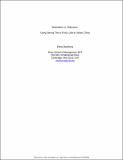Motivation vs. relevance: Using strong ties to find a job in Urban China
Author(s)
Obukhova, Elena
DownloadObukhova_Motivation.pdf (81.83Kb)
OPEN_ACCESS_POLICY
Open Access Policy
Creative Commons Attribution-Noncommercial-Share Alike
Terms of use
Metadata
Show full item recordAbstract
While the idea that contacts matter in finding a job is intuitively appealing, we still do not know—after decades of research—how and why strong ties benefit job seekers. To resolve this confusion, we need to theorize how specific characteristics of ties are related to the mechanisms that make job search through contacts effective. We have reasons to expect that, while a contact’s motivation influences the likelihood that a job seeker receives an offer, her homophily with the job seeker on occupation and other job-relevant attributes influences the quality of the offer. The use of strong ties among university students to find jobs in China provides a unique opportunity to empirically isolate the relationship between contact characteristics and the mechanisms through which contacts benefit the job seeker. I tested my hypotheses with data on both the successful and unsuccessful job searches of 478 graduates of China’s flagship universities, who, as first-time job seekers, primarily used strong ties. Survey results are consistent with my hypotheses: job seekers who used strong ties to look for jobs had more offers—but not better offers—than those who used only formal methods.
Date issued
2012-05Department
Sloan School of ManagementJournal
Social Science Research
Publisher
Elsevier B.V.
Citation
Obukhova, Elena. “Motivation Vs. Relevance: Using Strong Ties to Find a Job in Urban China.” Social Science Research 41.3 (2012): 570–580. Web.
Version: Author's final manuscript
ISSN
0049-089X
1096-0317